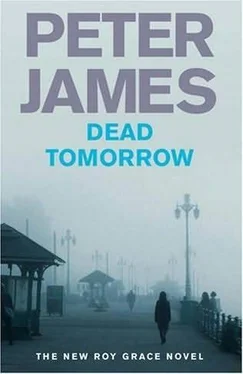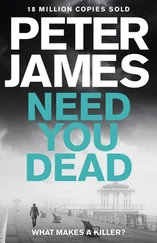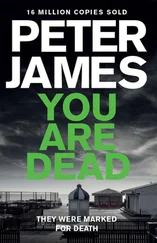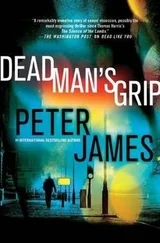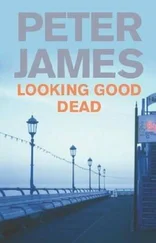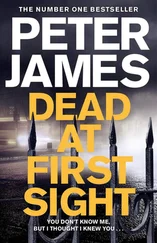A young woman, chicly dressed with short black hair, sat behind an ornate, antique desk.
‘ Guten Morgen , Herr Taylor,’ she said, with a cheery smile. ‘Frau Hartmann will see you shortly. Please take a seat. May I get you something to drink?’
‘Coffee would be great.’
Grace sat on a hard white sofa. On a glass table in front of him was a stack of the company’s brochures. On the walls were framed photographs of happy-looking people. They ranged in age from a small child playing on a swing to an elderly, smiling man in a hospital bed. No captions were needed. They were all clearly satisfied customers of Transplantation-Zentrale.
He picked up one of the brochures and was about to start reading it when a door opened behind the secretary and out stepped a strikingly handsome and confident-looking woman. She was in her early to mid-forties, he guessed, with beautifully groomed, shoulder-length blonde hair, wearing a slinky black trouser suit, shiny black boots and several big rocks on her fingers, including her wedding one.
‘Mr Taylor?’ she said, in a warm, guttural accent, striding towards him in a cloud of her own perfume, with her hand outstretched. ‘Marlene Hartmann.’
He shook it, feeling the bite of her rings cutting into his flesh.
She stood for a moment, staring at him with bright, inquisitive grey eyes, as if appraising him. Then she gave him what appeared to be a smile of approval.
‘Yes,’ she said. ‘It’s nice that you came here to see me. Please come to my office.’
Her mixture of considerable physical beauty and sexiness, combined with an element of professional coldness, reminded him of Alison Vosper. This woman definitely had a hard, don’t mess with me edge to her.
She ushered him through into a room that made him realize, for the first time, just how similar Cleo’s and Sandy’s taste in furniture was. This could be a room that had been decorated by either of them. It was carpeted in white and the walls also were in the purest white, relieved only by a triptych of white abstract paintings in black frames. There was a curved black lacquered desk, on which sat a computer terminal and some personal artefacts, a few fine plants and, strategically placed around the room, tall, abstract sculptures rose from plinths. In several places, white scented candles were burning here too, the same vanilla, but it was almost drowned out by the pungency of the woman’s perfume. He liked it, but it smelled masculine to him.
In front of the desk there were two high-backed upright chairs that looked as if they had come from a museum of modern art, and he sat down, as bidden, in one of them. It was marginally more comfortable than it looked.
Marlene Hartmann sat opposite him, behind her desk, opened a leather-bound notepad and picked up a black fountain pen.
‘So, first would you please tell me, Mr Taylor, how Transplantation-Zentrale may be of assistance to you? And perhaps, first, how it is you have heard of us?’
Being careful not to fall into an elephant trap, Grace said, ‘I found you on the Internet.’
From the way she nodded, approvingly, the answer seemed to satisfy her. ‘ Gut. ’
‘The reason I’ve come to see you is that my nephew – my sister’s son – who is eighteen years old, is suffering from liver failure. My sister is afraid that he will not get a transplant in time to save his life.’
He paused as the assistant brought him a cup of coffee and a jug of what he thought was milk but, when he poured, realized was cream.
‘You are based where, Mr Taylor?’
‘In Brighton, in Sussex.’
‘You have a system, I think, in your country that is – how do you say it in English? – a little arborary. No, arbitrary.’
‘You could say that,’ he agreed enthusiastically, doing all he could to bond with this woman and gain her trust.
Then, leaning across her desk towards him, she placed her elbows on the surface, interlocked her finely manicured hands and cradled her chin on them, peering, almost seductively, deep into his eyes.
‘Tell me, does your nephew have chronic or acute liver failure?’
Suddenly, to his horror, Grace found himself completely thrown. The bloody researcher had not differentiated between the two for him. Acute seemed the obvious answer to him. Acute smacked of urgency. Chronic , he knew, meant a disease that you lived with for years.
‘Acute liver failure,’ he replied.
She noted this down. Then she looked up at him. ‘So, what time frame do you think your nephew has?’
‘A month, maybe,’ he replied. ‘After that he may not even be strong enough to cope with transplant surgery.’
‘He is in which hospital?’
‘He has been treated at the Royal South London, but at the moment he’s back home.’
‘And what is the condition that the boy has?’
‘Auto-immune hepatitis,’ he said. ‘This is now causing severe cirrhosis.’
She marked this down, too, with a grimace, as if to show she understood the severity.
‘Can you tell me what service your company is able to provide?’
‘Well,’ she said, ‘we are approaching the Christmas holiday period, so I think we need to move quickly. Normally the transplant and aftercare are effected at a clinic somewhere within comfortable reach of the recipient’s home. If budget is a problem, there are certain cheaper alternatives, to have the operation in China, India and one or two other countries, for example.’
‘What is the price for a liver transplant in the UK?’
‘Do you know what is the blood grouping of your nephew?’
‘AB negative,’ he said.
Her eyes flickered and the faintest frown appeared on her face. ‘Not so common.’
‘I know.’
‘Our price for a liver is three hundred thousand euros. We need 50 per cent in advance, before we start to look, and 50 per cent on delivery, before the transplant takes place. We guarantee to find a matching liver within one week of receipt of the deposit.’
‘Even a rare blood group?’
‘Of course,’ she said, confidently.
‘So, with my nephew living in Brighton, in Sussex, in England, where would the transplant operation take place?’
‘Brighton is a nice city,’ she said.
‘You’ve been there?’
‘Brighton? Ja , sure. With my husband, we made a tour of England.’
‘So, you have a facility near to Brighton?’
‘We have many facilities around the world, Mr Taylor. That you have to trust us on. In some we have the facility for liver and kidney transplants, in some heart and lung, and in some all four. I can give you references who are very satisfied with our service. People who would not be alive today without what we do. But there is no pressure. In your country, a thousand people die each year because they are unable to obtain an organ for the operation which could have saved them. Yet one million, two hundred and fifty thousand people a year die in road accidents around the world. At Transplantation-Zentrale we are merely the facilitator. We are giving comfort to the families of loved ones who have died suddenly and tragically, by creating a use for their organs – in saving the lives of others. In doing this, you see, it gives some kind of purpose to each loved one’s death. You understand?’
‘Yes. Which do you do in Sussex?’
‘Liver and kidneys.’ She looked at him quizzically. ‘You carry an organ donor card yourself?’
He blushed. ‘No.’
‘You and most of the world. Yet, if you wake up tomorrow with kidney failure, Mr Taylor, you will be grateful that someone else did.’
‘Good point. Tell me something, is there anyone in the Brighton area who has used your services, who I could talk to?’
Читать дальше
